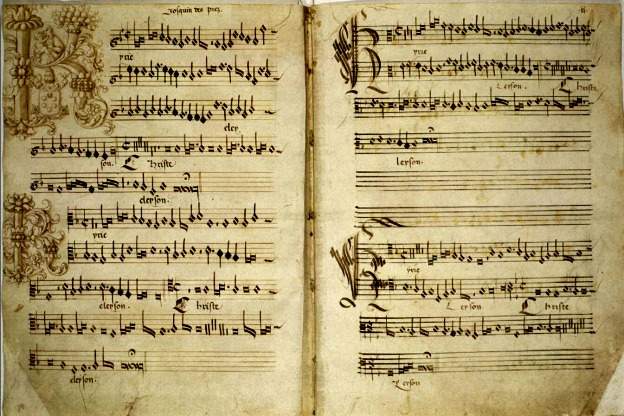
Before we head into the land of misnomers, let's pay a visit to the realm of Anonymous with a performance of a 13th-century Trouvére song.
The first verse translates:
"Rose which snow and ice / cannot mar nor mute its color, / amid the high salt sea / a small fountain of sweetness, / light in shadow, / joy in sadness, / in fire, dew."
We have no idea who wrote it, but we do know who performed it! Trefoil: a group of modern medieval minstrels, on a recently released CD called Fleur De Valeur: A Medieval Bouquet. We'll hear more music and floral imagery from this recording later in the hour.
Durante's Magnificat
In 1767, Rousseau enthusiastically described Francesco Durante as "the greatest master of harmony of Italy, that is to say, of the whole world." Composer and teacher Johann Adolph Hasse on the other hand thought Durante's music was dry, coarse and uncouth!
Well, you can't please everyone! But, Hasse's opinion aside, Durante's music remained popular long after he died; his famous Magnificat in B flat was performed all the way through the nineteenth century.
Durante's name might be more familiar today if it weren't for a scholar named Giuseppe Radiciotti, who in 1910 used a single manuscript copy to contend that Durante's Magnificat was instead the work of Durante's student, Giovanni Battista Pergolesi. Soon thereafter the Magnificat was published in an edition of Pergolesi's collected works, and the misattribution stuck.
But now the pendulum has swung back the other direction: it turns out that Pergolesi's Magnificat might just be the best piece that Durante ever wrote!
Family resemblance
Alessandro Marcello had a government job in Venice, but composed music on the side, publishing some of his own works under his pen name Eterio Stinfalico. The Oboe Concerto in D minor is perhaps Alessandro Marcello's most famous work. Transcribed by Bach, it was at one time attributed to Vivaldi, and at another time it was mistaken as a work by Alessandro's little brother, Benedetto.
Move over little brother (Benedetto)! That was an oboe concerto by the other Marcello brother, Alessandro.
Willaert says, "But I wrote that!"
During the Renaissance, Josquin Des Prez was so admired that opportunists quickly discovered that they could increase sales by branding works with Josquin's name, never minding whether he actually composed the music or not. In 1540, the German editor Georg Forster famously recounted: "now that Josquin is dead, he is putting out more works than when he was alive!"
Here's a classic case of mistaken identity: Sometime around 1515 on a visit to Rome, Adrian Willaert heard the singers in the papal chapel performing his six-voice motet Verbum bonum et suave. But, the singers thought the motet had been composed by the distinguished Josquin Des Prez. When Willaert told them he was actually the composer, [quote] "so great was the malignity or (to put it more mildly) the ignorance of the singers, that they never wanted to sing it again!"
This story, related by the 16th-century writer and composer Gioseffo Zarlino, was once considered doubtful but has since gained credibility. These days, Verbum bonum et suave is usually considered to be Willaert's work and not Josquin's.
Here's another case of mistaken monikers. Johann Wilhelm Hässler was a famous 18th-century keyboard virtuoso whose compositions blended baroque and classical styles. Hässler's C minor Fantasia was previously recorded as a piece by Bach's son, Wilhelm Friedemann, but has since been re-identified as Hassler's. (:30)
That was Hassler's Fantasia in C minor, formerly attributed to Wilhelm Freidemann Bach. We heard a performance by Michele Benuzzi playing a historic 18th-century instrument from the Russell Collection in Edinburgh. (:15)
Featured CD: A medieval bouquet!
Our featured recording is a 2013 Bridge Records release from the ensemble Trefoil titled Fleur de Valeur: A Medieval Bouquet. The program centers on images of magic, virtue, beauty, desire and the divine symbolized by flowers in the music and poetry of the middle ages.
Let's sample the floral imagery of roses and daisies in two tracks-first Rosa das rosas from the Cantigas de Santa Maria followed by Binchois' "Margarite fleur de valeur" or "Daisy-Worthy flower."
Break and Theme music
:30, Pergolesi: Stabat Mater, Le Poeme Harmonique, Alpha 2000, Tr. 4: (Farncesco Durante) Concerto No. 4 in G Major – Adagio (excerpt of 2:36)
:60, Music Barocca, Il Giardino Armonico, Teldec (2001) B000059QW3, Tr. 10: (Remo Giazotti) Adagio in G minor (excerpt of 2:04)
:30, Josquin: Motets & Chansons, Taverner Consort/Andrew Lawrence-King, EMI Classics 1993, Tr. 6: In te Domine speravi (excerpt of 2:28)
Theme:Â Danse Royale, Ensemble Alcatraz, Elektra Nonesuch 79240-2 1992 B000005J0B, T.12: La Prime Estampie Royal
The writer for this edition of Harmonia is Janelle Davis.
Learn more about recent early music CDs on the Harmonia Early Music Podcast. You can subscribe on iTunes or at harmonia early music dot org.
An extra bit about Josquin
Imitation is the sincerest form of flattery, and we've been left with many wonderful works in Josquin's style that may never have gained an audience without Josquin's moniker. Nevertheless, sorting out the resulting misattributions can by quite a trick!
The disputed authorship of the motet Inter natos mulierum is one of these works with little concrete evidence to support its Josquin attribution in two out of three sources. But it's a magnificent piece…whoever composed it!









